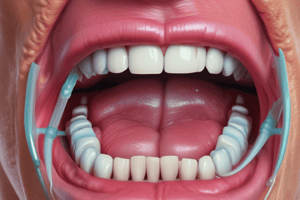Podcast
Questions and Answers
What is the most common indication for surgery in patients with chronic rhinosinusitis?
What is the most common indication for surgery in patients with chronic rhinosinusitis?
- Balloon-assisted sinus surgery
- Recalcitrant chronic rhinosinusitis to medical therapy (correct)
- Nasal septal deviation correction
- Concha bullosa resection
Which condition is characterized by the presence of nasal polyps and is often resistant to medical treatment?
Which condition is characterized by the presence of nasal polyps and is often resistant to medical treatment?
- Chronic rhinosinusitis with nasal polyposis (correct)
- Choanal atresia
- Sinonasal tumors
- Allergic fungal rhinosinusitis
In which scenario is balloon sinusotomy typically utilized?
In which scenario is balloon sinusotomy typically utilized?
- To remove foreign bodies from the nasal cavity
- For expansive sinonasal tumors
- To correct choanal atresia
- In the treatment of chronic rhinosinusitis (correct)
What is a common misconception about the treatment of allergic fungal rhinosinusitis?
What is a common misconception about the treatment of allergic fungal rhinosinusitis?
Which procedure is least likely to be used for chronic rhinosinusitis management?
Which procedure is least likely to be used for chronic rhinosinusitis management?
What condition may be treated with surgical intervention when chronic rhinosinusitis with nasal polyposis is present?
What condition may be treated with surgical intervention when chronic rhinosinusitis with nasal polyposis is present?
What is the primary goal of functional endoscopic sinus surgery (FESS)?
What is the primary goal of functional endoscopic sinus surgery (FESS)?
Which of the following statements best describes the significance of identifying anatomic landmarks during sinus surgery?
Which of the following statements best describes the significance of identifying anatomic landmarks during sinus surgery?
Which of the following is considered a complication that can arise from improper sinus surgery technique?
Which of the following is considered a complication that can arise from improper sinus surgery technique?
What does ostioplasty involve in sinus surgery?
What does ostioplasty involve in sinus surgery?
In the context of chronic rhinosinusitis, what is a potential reason for the urgency in opting for surgery?
In the context of chronic rhinosinusitis, what is a potential reason for the urgency in opting for surgery?
How should the surgical approach for patients with chronic rhinosinusitis be determined?
How should the surgical approach for patients with chronic rhinosinusitis be determined?
What role does balloon sinusotomy play in sinus surgery?
What role does balloon sinusotomy play in sinus surgery?
Which of the following conditions is most directly related to chronic rhinosinusitis that often only resolves with surgical intervention?
Which of the following conditions is most directly related to chronic rhinosinusitis that often only resolves with surgical intervention?
What is a necessary surgical intervention for acute complications of rhinosinusitis that do not respond to medical therapy?
What is a necessary surgical intervention for acute complications of rhinosinusitis that do not respond to medical therapy?
What is crucial to do when treating Invasive Fungal Rhinosinusitis (IFRS) in severely immunocompromised patients?
What is crucial to do when treating Invasive Fungal Rhinosinusitis (IFRS) in severely immunocompromised patients?
How often may serial debridements be necessary in the treatment of Invasive Fungal Rhinosinusitis?
How often may serial debridements be necessary in the treatment of Invasive Fungal Rhinosinusitis?
What is a common challenge faced when performing surgery for rhinosinusitis?
What is a common challenge faced when performing surgery for rhinosinusitis?
When considering the prognosis of patients with severe rhinosinusitis, what is generally true?
When considering the prognosis of patients with severe rhinosinusitis, what is generally true?
Which type of surgery should be considered only if there's specific evidence of an anatomic problem?
Which type of surgery should be considered only if there's specific evidence of an anatomic problem?
What is a key indication for using an open surgical approach in severe rhinosinusitis cases?
What is a key indication for using an open surgical approach in severe rhinosinusitis cases?
Which statement accurately reflects the outcome of surgical interventions for rhinosinusitis?
Which statement accurately reflects the outcome of surgical interventions for rhinosinusitis?
Flashcards are hidden until you start studying
Study Notes
Indications for Surgery
- Chronic Rhinosinusitis (CRS) that doesn't respond to medical therapy is the primary reason for surgical intervention.
- Surgical options are recommended for patients experiencing significant symptoms despite appropriate medical treatment.
- Surgery is generally adjunctive to ongoing medical therapy.
Surgical Approaches
- Functional Endoscopic Sinus Surgery (FESS) is the preferred method, aiming to restore mucociliary function.
- Importance of a systematic approach: surgery should follow a preformed plan to enhance success and minimize complications.
- Identification of anatomical landmarks is crucial during surgery, especially for the maxillary, sphenoid, and frontal sinuses.
Complications
- Acute complications, both orbital and intracranial, that do not improve with medical therapy require urgent surgical intervention.
- Invasive Fungal Rhinosinusitis (IFRS) typically affects immunocompromised patients, necessitating aggressive surgical debridement until healthy tissue is found.
- Serial debridements may be necessary every 2 to 3 days, with close monitoring via endoscopy and radiographic imaging.
Specific Conditions and Procedures
- Surgical treatment may include specific procedures like choanal atresia repair or removal of foreign bodies.
- External procedures are infrequently used, particularly in light of advancements in endoscopic techniques.
- Conditions like sinonasal tumors also warrant surgical approaches, potentially involving expanded transnasal techniques for better access to the skull base and orbit.
Prognosis and Considerations
- Surgical outcomes can vary, with the possibility of being unsuccessful or even exacerbating headache symptoms.
- Surgery should be individualized; understanding the disease's pathophysiology and patient symptoms is essential for tailoring surgical intervention.
- Continuous assessment of symptoms and therapeutic responses is necessary to optimize care for patients with CRS.
Studying That Suits You
Use AI to generate personalized quizzes and flashcards to suit your learning preferences.




